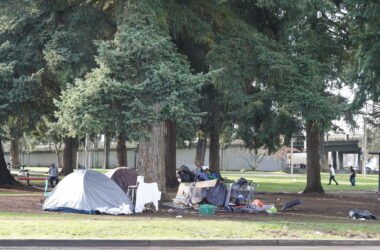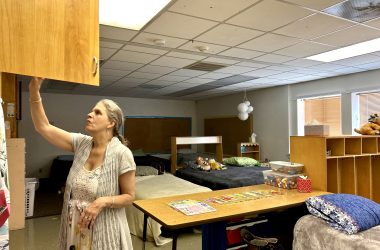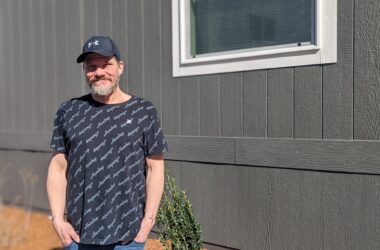Toni Maries was trying not to overdo it. With an autoimmune disorder and a surgery coming up, too much exertion for the 55-year-old meant she would have to spend the rest of the day in bed.
She was moving a lot, lately.
On a February afternoon, she sat on one of several dining chairs not yet tucked under a table at her apartment in Salem’s newest affordable housing complex, Sequoia Crossings.
She’d lived there for less than a week. Her best friend, a German Shorthaired Pointer named Tucker, was resting at her feet and keeping a careful eye on the door. He hadn’t quite settled in yet, huffing often and pacing occasionally, but he was getting there.
“He likes it very, very much,” Maries said of her new apartment. “But in the beginning, because we’ve moved so many times in the last six, seven months, he was kind of like, ‘Is this ours? We’re staying here? Or is this temporary?’”
Maries had been asking herself the same questions. She’d been sleeping in Salem’s homeless shelters since last summer.
She was one of the first people invited to sign a lease at the newly built affordable housing complex in north Salem owned by the Salem Housing Authority and Enterprise Community Partners.
The building at 2950 Broadway St. N.E. has 60 apartments, most of them with one bedroom. Applicants who have been chronically homeless got priority at the complex, which held its grand opening in January. Subsidized rent and on-site help from case managers are intended to keep residents housed and moving toward other goals.
Maries was among the first group to move in the first week of February. She spent the weekend lifting boxes – overdoing it – and the effort was met with a pain flare up. But she wanted her new space to be clean, and she’d made progress.
By Valentine’s Day, she’d unpacked the donated welcome basket she and the other residents received on arrival, with pots and pans, utensils, cleaning supplies, towels and a shower curtain. She’d moved some of her belongings out of storage and her pod at the micro shelter site where she’d been living. Her son had saved some of her things.
Most of the work was done, but there were still some boxes to unpack. Some contained photographs of the last 20 years of her life, before she knew what it was like to be on the other side of the social service system, asking for help. She said she never imagined this path for herself.
“I’ve faced war, I’ve spent days wondering if my spouse was alive or dead. I’ve been homeless,” she said, taking a shuddering breath through tears. “I don’t know. It’s changed who I am. A lot.”
A national scandal
Boxes near the front of Maries’ pile near the living room, opened but still unpacked, had the contents of her former husband’s “I Love Me Wall.” It’s a joke among military families for the collection of awards, plaques and portraits from their career that often take up a whole wall of the home.
Her ex-husband, Kevin Maries, was a sergeant in the Army National Guard, and a decorated marksman. After the September 11 attacks, he worked to requalify officers in marksmanship skills in Oregon and then was head of security at the Eugene Airport until the Transportation Security Administration took over, she said.
When Maries became homeless, she had to make a decision between keeping those mementos and her extensive book collection that her family used to tease her about.
“I was telling my son, his dad got the last laugh,” she said, smiling and looking through the box. “I gave up all of my books – which did nearly kill me – and here I am. He is dead and I am custodian of his sh-t.”
Maries’ path to homelessness began when her then-husband was deployed to Iraq.
On June 29, 2004, he watched through his scope as Iraqi officials beat Sudanese prisoners with a metal rod. He took pictures. According to reporting from The Oregonian, he sent increasingly distressed messages to his superiors before warning that he was going to shoot to stop the violence against the prisoners.
That prompted U.S. soldiers to race into the compound, where they disarmed the officials and found dozens of people, including teens, bruised, beaten and in a room pungent with urine and vomit. When soldiers started to treat the victims, higher command came in over the radio to order them to leave, return the weapons to the Iraqi officers and to not tell anyone about what they saw.
After The Oregonian reported on the incident, the decision to leave the prison without aiding the prisoners became a national scandal. Further details were released by WikiLeaks in 2005.
Maries considers her ex-husband to be a hero for his actions that day, and for blowing the whistle about it afterward.
Before he deployed, they had bought a house on Valleywood Drive in south Salem, which she chose for its schools. She promised that he’d come home to his own “I Love Me Wall.”
“He didn’t make it,” she said.
He did come home, but not as the man she’d married.
When he was set to return to Salem in 2005, she said a psychologist came to speak with her and the other army wives. They told her what post-traumatic stress disorder was going to look like. They said there’d be a honeymoon period. They were right.
“He was textbook,” she said. “We had a three-month honeymoon and then it just got dark and scary real fast.”
She described a tumultuous life for them in the subsequent years, which she blamed in part on the effects of his war service.
“The person they sent to war is not the person that came home,” she said, through tears.
They divorced in 2007 and he later remarried.

Maries never gained financial stability back after her marriage ended. She spent nearly two decades living paycheck to paycheck as a single mom with two children. Several times, her rent was more than she could afford.
Maries worked at the Oregon Department of Justice for a decade, until 2008, collecting child support payments from parents. She said it taught her patience with people going through hard times, and gave her the tools to navigate the system herself.
She briefly worked at T-Mobile before taking a job in information services at the Department of Human Services and Oregon Health Authority, where she worked until 2013. She worked for the judicial department after that.
The whole time, she was plagued by painful, undiagnosed health issues that forced her to call out.
“My health would flare, I would miss work, I even sometimes lost jobs because I couldn’t go back before the family time ran out,” she said. “There’s no safety net for that.”
She eventually ended up in the service industry, managing two bars and working on her feet all day before quitting in 2020.
In 2022, she was finally diagnosed with an autoimmune disorder which causes painful inflammation and limits mobility.
Last February, her son was doing his best to keep them housed. Then he got a call that the business he was working at had closed without notice.
“He wasn’t unemployed for more than about four days. But we were already struggling just enough,” she said. They kept up with their rent payments for another five months, but their money ran out. They were homeless by late July.
Her son moved in with his grandparents.
Maries found herself in her first shelter, standing in front of the cork board wall at the Salvation Army on Front Street. Even with her work experience, she had trouble figuring out her options.
She took pictures of everything on the bulletin board, all the organizations offering services, and then started making calls.
“What I discovered is that basically you need to get into the Homeless Management Information System,” she said, which she’d known a little about from her prior work in social services.
The best way to access it in Salem, she said, is to fill out a housing intake form at The ARCHES Project downtown, which asks about mental health needs, addiction, domestic violence and other experiences to consider placement.
She sought reference letters from staff at the Salvation Army and the Recovery Outreach Community Center, knowing it was important to create a record that she was advocating for herself.
She shared the letters with Church at the Park, and moved into the Village of Hope micro shelter site on Northeast Center Street on November 7. She said she spent less time on the waitlist than most.
“I have fewer obstacles, and I have multiple medical issues that triaged me higher on the lists,” she said.
Getting into a Church at the Park shelter meant she was assigned to a case manager who helped set milestones and a list of tasks to accomplish.
“I think that’s a huge piece that can ensure success,” she said. She still had her social security card, birth certificate, health insurance and food stamps which helped shorten that tasklist.
She lived in a pod at the micro shelter for over three months. In that time, she advocated for the other residents, including during an ice storm in January which prevented disabled residents from accessing the bathroom.
Her son kept track of her, and visited her every week on his day off to drive her to doctor’s appointments. He looked out for her neighbors, giving them money for food. He’s now 26.
“He shouldn’t have to take care of me,” she said.

Maries moved up the housing waitlist, and met with the Salem Housing Authority in late January before signing her lease for an apartment at Sequoia Crossings. Her biggest concern was that her rent would be able to outpace her income and force her to move again, like it had too many times before.
Because her current income was only food stamps, her rent is $3 a month, a discount of over $1,100. It will only go up if her income does. Tenants at the property get rent subsidized through a mix of federal, state and local housing authority money.
She moved in on Feb. 7. She can stay in the apartment for as long as she wants to, and in two years she’ll be eligible for a housing voucher that can be used at other complexes. She’s working to get Social Security benefits before then.
Sequoia Crossings is one of the few supportive housing communities in Salem that offers on-site case managers for social services. It’s optional, but something Maries is grateful to have especially because her case manager has been homeless too.
In their first meeting, the case manager offered optional assistance with legal issues, child custody, mental health and addiction services. She said the range of support helps people stabilize and get back to being productive community members.
So far, Maries’ case manager has helped her with accommodations for her illness, like permitting her dog to be off-leash when her health flares, and giving notice to others that they shouldn’t repeatedly knock on her door because loud noises can trigger her PTSD.
“I think that’s forward thinking, that is critical thinking, that’s really smart,” she said. “They’ve got some good people up there ready and willing to jump in and get their hands dirty.”
She said her time being homeless taught her a lot.
“I’ve met some really amazing, authentic homeless people,” she said.
She also met unkind people, but she said they were often having a crisis and wanting to be heard.
A lot of them, especially those who have spent longer on the streets, need even more support than she did. She knows of someone who couldn’t handle sleeping at the city’s Navigation Center and went back outside, and another who moved into an apartment and set a tent up inside.
“There’s going to be people that are not going to conform to certain types of living, and they can’t. I’m not saying never, but it’s not going to happen next week,” she said.
Maries said she sees more advocacy in her future. Within her first week, she gave the Housing Authority feedback about the challenges neighbors faced with payments at the laundry room, and while she loves taking her dog to the nearby River Road Park, she thinks it needs a safer crosswalk for the neighborhood kids.
She didn’t want life to be this hard for her kids, but she’s proud of the people they’ve become. Her son works as a bistro cook and steps up to help others, and her daughter recently finished a college degree in business and cybersecurity.
“It’s been two years and a week since I got my diagnosis,” she said, and teared up. “Not what I thought it was going to look like, but not horrible. Not the worst thing in the world. We survived it, and we miraculously seem to be in the right places at the right times for the things that we needed to be there for.”
Since moving in last month, Maries had a successful surgery followed by a challenging recovery. She’s had the worst flare of her autoimmune disorder in over a decade, but she’s grateful to be housed during it.
Her son still visits once a week, and he helps her get creative with her Marion Polk Food Share deliveries. Last week, they made homemade hummus with roasted peppers and caramelized onions. She’s planning to learn to make cauliflower into pizza dough.
She’s looking forward to shopping at the Salem Saturday Market this summer, where she can use her food stamps, and will be getting involved in a planned community garden at the complex.
She sees a mental health professional every week and is working though the lasting anxiety which tells her the apartment isn’t really hers.
“Trying to acclimate. Trying to figure out what will help me thrive here,” she said. “Because I intend to thrive.”
EDITOR’S NOTE: This story has been revised to remove certain information about Toni Maries’ former husband in response to family concerns reviewed and considered by our staff.
RELATED COVERAGE
Contact reporter Abbey McDonald: [email protected] or 503-575-1251.
SUPPORT OUR WORK – We depend on subscribers for resources to report on Salem with care and depth, fairness and accuracy. Subscribe today to get our daily newsletters and more. Click I want to subscribe!
Abbey McDonald joined the Salem Reporter in 2022. She previously worked as the business reporter at The Astorian, where she covered labor issues, health care and social services. A University of Oregon grad, she has also reported for the Malheur Enterprise, The News-Review and Willamette Week.









